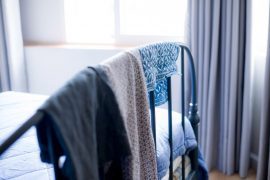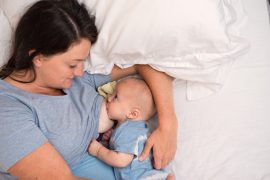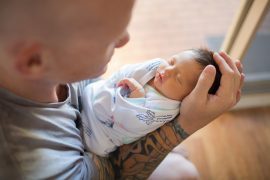Sleeping Arrangements
The choice of where our children sleep affects (and there is research to show all of this): breastfeeding duration, feeding frequency, infant sleep position, arousal patterns, temperature, carbon dioxide levels, crying, heart rate, parental emotional expectations.
Babies who have more skin-to-skin contact with their parents show better oxygen delivery, less frequent crying, higher temperatures, better weight gain, better digestion and less physiologic markers of infant stress. (It’s why kids who are held more have less colic.) So, based on that, it makes sense that more contact with mum and dad makes for a more physiologically sound child.
Sleeping Alone
This is what we are supposed to do. Kids should learn to sleep by themselves to become more independent, less dependent on mum and dad, able to handle situations better when confrontation happens in the future. In general, kids who sleep by themselves are better humans. Right? Does that even make sense?
Interestingly, and really tragically, we (and now I mean me as a doc) said over and over again that sleeping alone was where kids needed to be. And we as parents did that. We put our kids on their stomach. They were sleeping alone, getting really deep levels of sleep that they were never built to handle, got high levels of carbon dioxide around them, and some died.
The great majority of deaths of infants occurred while they were sleeping alone. We never asked “Is it safe for children to sleep alone?” We got our answer — it’s safe if they are on their back, on a hard mattress, without any environmental smoke exposure, and if there are no other soft fluffy things in the crib. We learned that answer the hard way: 92% of the infant deaths in a the 1999 Consumer Product and Safety Commission data base occurred while infants slept alone outside of adult supervision.
Studies recently published show that kids who were never in their parents bed tend to be harder to control, more fearful than children who were permitted to bedshare, more dependent on their parents, and dealt less well with stress. I am not advocating for all children to bedshare nor would I. We always need to look at the risks and benefits – and the result will be different for every family.
Co-sleeping
Co-sleeping needs to be defined. It means being close to your baby as they sleep. I say this because we often associate co-sleeping with sleeping with a baby in bed. And when we say “never put a baby in bed with you” many will chose an alternative such as a couch or recliner which is often more dangerous. If you do choose to co-sleep, there are safe ways to do it, and some groups that should reconsider that decision. Again, we need to weigh the benefits and risks. If you choose to co-sleep, we should do it safely.
Safely co-sleeping: (these are going to look a lot like the recommendations for SIDS prevention)
- Don’t smoke
- Breastfeed: mounting evidence suggests that formula fed kids need to sleep nearby but not in bed!
- Don’t sleep with your baby if you have been drinking, or using mind altering drugs (duh!)
- Sleep on a hard mattress (no waterbeds, soft sofas, soft bedding)
- Keep the baby on their back (this usually isn’t too hard) or snuggled on your chest (on your sober body!)
- Use a sleeper to make them warm… no blankets
- No pillows for the baby
- No spaces between the headboard and the wall
I think these recommendations are interesting. If you were sleeping on a hard mattress, without a pillow or blankets, near someone, you might not get very deep levels of sleep. The SIDS prevention recommendations (which include keeping the baby in the parents’ room and not alone in a different room) are the same – the interventions are to prevent deep sleep. If we don’t want deep sleep, what are we trying to do? We are trying to keep the baby arousable. The baby needs to be able to respond to changing environmental conditions. We are avoiding deep sleep.
How come my friend’s baby sleeps through the night?
I don’t know. I don’t even know what that means. When I ask about what that means, I get a great variety of answers. Some people think six hours of sleep at night is “through the night”. Other people want to sleep like they did before they had kids.
I would guess that many of the kids aren’t sleeping through the night (some do, and that may be just fine), but that the implications of admitting that your kid isn’t sleeping are too hard to admit. We equate “good sleepers” with good kids, and “bad sleepers” with bad kids. Our culture allows us to derive moral implications from normal baby behaviors. And of course, parents of good sleepers are good parents. We would all benefit from trying to eliminate these perceptions. I don’t think they help anyone.
We equate “good sleepers” with good kids, and “bad sleepers” with bad kids. Our culture allows us to derive moral implications from normal baby behaviors. And of course, parents of good sleepers are good parents. We would all benefit from trying to eliminate these perceptions. I don’t think they help anyone.
Plus, feeding choice plays a role here. Formula fed kids sleep differently than breastfed kids. Formula fed kids sleep for longer stretches of time and therefore have less contact with their parents at night. Formula fed children are much more likely to be sleeping alone.
The sleep training techniques that have been sold in the US have never been shown to be associated with anything good for infants but they have been associated with risks, like more anxious children and behavior disturbances in the long term. There is no emotional, social or intellectual benefit to the kids, nor has it ever been shown to help us develop into healthy adult sleepers. They might help the family sleep in the short term. We need to balance the short term with the long term. I know that’s very hard to do when you are sleep-deprived.
We have to decide what we want from our kids sleeping through the night. Do we want to seen as good parents? If you think that you are, why ask for external validation? Embrace it and enjoy your family. Do we, as parents, want to sleep? Of course we do. Then, to sleep well, we need to be comfortable with the choices we make to help our child sleep. If you try sleep training and it doesn’t feel right, then don’t do it. Other families may have different experiences and feel comfortable with that choice. Great, as long as we are doing sleep training knowing that the SIDS prevention guidelines want the children nearby and not alone. [Editor’s note: The Natural Parent Magazine does not agree with sleep training of any kind.]
We need to have a realistic expectations of normal sleep behavior of little children. And we really need to reset our cultural expectations of that sleep behavior. If the answer to “is your baby sleeping through the night” is “no” maybe the response could be an offer of support to the tired parents.
Originally published HERE.
By Jenny Thomas, MD, MPH, IBCLC, FAAP, FABM, from Dr. Jen 4 Kids. You can also find her on Facebook at @DrjenBFMedand @Drjen4kids.










